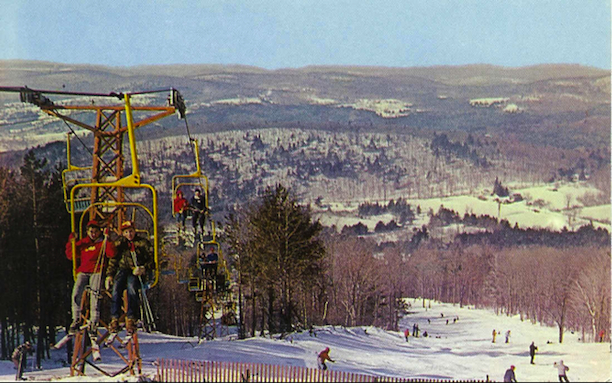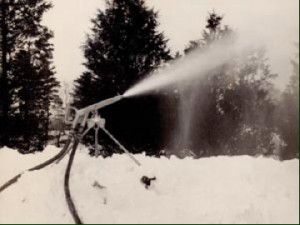…that in the early 1950s innovative Connecticut minds created the first documented artificial snow for the state’s skiers and sports lovers.
In the 1930s skiing became a popular pastime at Mohawk State Park in Cornwall, located in the state’s northwest corner. Roads previously built through the forest were turned into ski trails and in 1939 the Camp Tourney CCC constructed the first downhill trail on the mountain. In the mid-1940s Walter R. Schoenknecht leased the northwest side of the mountain from the state and developed a ski resort with six trails and tows. By 1948 the resort had nine trails and tows, an expanded parking area, and was a local hotspot, attracting winter sports lovers from all over.
Skiing in the 1948-49 season in Connecticut proved difficult because of below-average snowfall. Schoenknecht did not let this deter him, though, and he started to experiment with artificial snow. He first experimented by grinding ice blocks brought in from Torrington, and even though that proved ineffective, he did not give up. By 1950 he had an idea that would someday revolutionize the sport of skiing. Taking inspiration from tobacco field equipment, Schoenknecht contacted the equipment’s maker, Larchmont, and began a collaboration with the Tey Manufacturing Company. Together, they tried to replicate a machine that used compressed air and water on tobacco crops to create snow. The goal was to develop a snow-making machine that “mimicked the natural atmospheric process that produces snow.”
Under a shroud of secrecy, trial runs began, and with just a few neighborhood interruptions, the team fabricated snow that would cover the slopes for the throngs of winter sports lovers. Today, 95% of Mohawk’s snow is man-made and snow machines are fixtures at slopes all over the world. While inventors experimented with snow-making machines as early as the 1930s, Tey’s original snowmaking prototype at Mohawk Mountain produced the first documented artificial snow for skiing.










